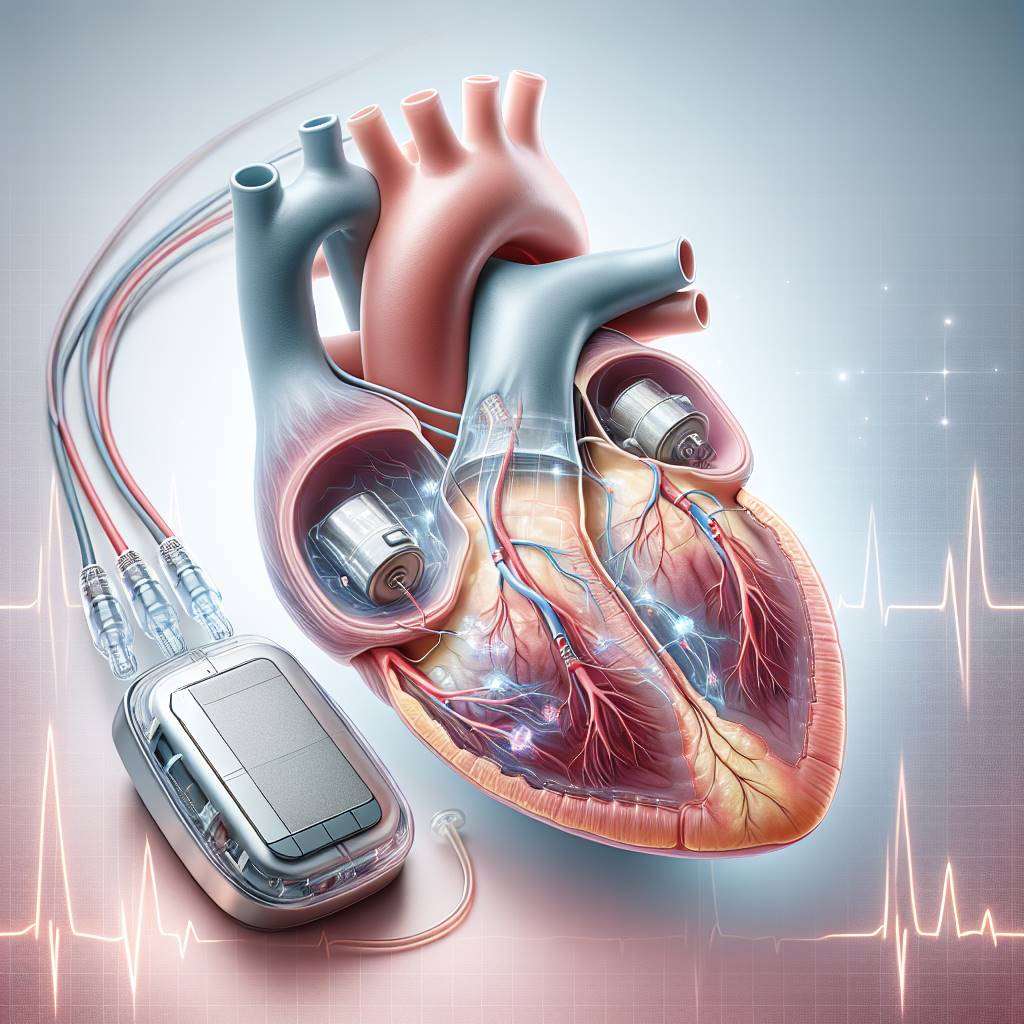A pacemaker is a small medical device implanted in the chest to regulate abnormal heart rhythms, ensuring a steady heartbeat. One common question among patients is, "How long does a pacemaker last?" Understanding the lifespan of a pacemaker is crucial for planning follow-up care and ensuring timely replacements, which are essential for maintaining heart health.
Medical disclaimer: This content is for general awareness and does not replace a doctor’s consultation. For diagnosis or treatment decisions, consult a qualified specialist.
The longevity of a pacemaker depends on various factors, including the type of device, usage, and patient-specific conditions. Proper replacement planning is vital to avoid complications like device failure. This article explores the average lifespan of pacemakers, factors influencing their durability, and how to prepare for replacement surgery when needed.
What Is the Average Lifespan of a Pacemaker?
The average lifespan of a pacemaker typically ranges between 5 to 15 years. This variation depends on the type of pacemaker and how frequently it is used to regulate the heart's rhythm. For instance, devices that are used more frequently may have a shorter lifespan due to higher battery consumption.
Modern pacemakers are designed with advanced technology, ensuring durability and reliability. However, the battery life is a key factor in determining when a replacement is needed. Once the battery depletes, the pacemaker itself does not fail, but it must be replaced to continue functioning effectively.
Regular follow-ups with your cardiologist are essential to monitor the device's performance. During these visits, your doctor will check the pacemaker battery status and overall functionality to ensure it is working optimally.

Factors That Affect How Long Pacemakers Last
Several factors influence the lifespan of a pacemaker. One of the most significant factors is the frequency of use. Patients who rely heavily on their pacemaker to regulate heart rhythms may experience faster battery depletion compared to those who use it less frequently.
The type of pacemaker also plays a role. For example, single-chamber pacemakers generally consume less energy than dual-chamber or biventricular devices. Additionally, advancements in pacemaker technology have led to more energy-efficient devices, which can last longer.
- Patient activity levels and heart condition
- Settings and programming of the pacemaker
- Quality of the device and battery
Environmental factors, such as exposure to strong electromagnetic fields, can also impact the device's performance. Regular monitoring and proper care can help maximize the lifespan of your pacemaker.
Signs Your Pacemaker May Need Replacement Soon
Recognizing the signs that your pacemaker may need replacement is crucial to avoid complications. One of the most common indicators is a warning from the device itself. Modern pacemakers are equipped with alerts that notify your doctor when the battery is running low.
Other symptoms to watch for include:
- Fatigue or dizziness
- Shortness of breath
- Irregular heartbeats or palpitations
- Fainting or near-fainting episodes
If you experience any of these symptoms, it is essential to consult your cardiologist immediately. Regular check-ups can help detect issues early, ensuring that your pacemaker replacement is planned well in advance.
How to Plan for Pacemaker Replacement Surgery
Planning for pacemaker replacement surgery involves several steps to ensure a smooth and safe procedure. The first step is scheduling regular follow-ups with your cardiologist to monitor the device's battery life and performance. Once the battery reaches a critical level, your doctor will recommend a replacement.
Before the surgery, you may need to undergo tests such as an ECG or imaging studies to assess your heart's condition. It is also important to discuss any medications you are taking, as some may need to be adjusted before the procedure.
The replacement surgery is typically less invasive than the initial implantation. Most patients can return home the same day or within 24 hours. Proper post-operative care, including avoiding strenuous activities, is essential for a smooth recovery.
Do Modern Pacemakers Last Longer Than Older Models?
Yes, modern pacemakers are designed to last longer than older models, thanks to advancements in technology. Improved battery efficiency and energy-saving features have significantly increased the lifespan of these devices.
For example, newer pacemakers often use lithium-based batteries, which are more durable and reliable. Additionally, advanced programming allows the device to adjust its energy usage based on the patient's needs, further conserving battery life.
A comparison of older and modern pacemakers highlights these improvements:
| Feature |
Older Models |
Modern Models |
| Battery Life |
5–7 years |
10–15 years |
| Energy Efficiency |
Basic |
Advanced |
| Technology |
Limited |
Smart features |
Regular advancements in medical technology ensure that pacemakers continue to improve, offering patients better reliability and longer lifespans.
Battery Life of Pacemakers: What You Should Know
The lifespan of a pacemaker is a critical factor for patients relying on this life-saving device. Most modern pacemakers last between 5 to 15 years, depending on the type of device and its usage. The battery life is influenced by how often the pacemaker needs to send electrical impulses to regulate the heart.
It is important to note that the pacemaker itself does not fail when the battery depletes. Instead, the device will alert your doctor well in advance, allowing for timely replacement. Regular follow-ups with your cardiologist are essential to monitor the device's performance and battery status.
Factors affecting battery life include the device's settings, the patient's heart condition, and the frequency of use. Understanding these factors can help in better planning for replacement.

When Should You Replace Your Pacemaker Device?
Replacing a pacemaker is a planned procedure that typically occurs when the device's battery is nearing the end of its life. Most pacemakers are designed to give a warning signal, which can be detected during routine check-ups. This ensures that patients have ample time to schedule a replacement.
Signs that it may be time to replace your pacemaker include a noticeable decrease in energy levels or symptoms of your original heart condition, such as irregular heartbeats or dizziness. However, these symptoms are rare due to the advanced warning systems in modern devices.
- Regular follow-ups with your cardiologist are crucial.
- Device checks can identify battery depletion early.
- Replacement is usually a straightforward procedure.
Always consult your doctor if you experience any unusual symptoms or have concerns about your pacemaker's performance.
How Doctors Determine Pacemaker Replacement Timing
Doctors use several methods to determine when a pacemaker needs replacement. During routine check-ups, the device's battery status is assessed using a specialized programmer. This tool provides detailed information about the battery's remaining life and the device's overall functionality.
In addition to battery checks, doctors may monitor the patient's symptoms and heart activity. If the pacemaker is not functioning optimally or if the patient experiences symptoms like fatigue or irregular heart rhythms, it may indicate the need for replacement.
Advanced pacemakers often have built-in alerts that notify both the patient and the doctor when the battery is low. This proactive feature ensures timely intervention, minimizing risks associated with device failure.
Can Lifestyle Choices Impact Pacemaker Longevity?
Yes, lifestyle choices can significantly impact the longevity of a pacemaker. Activities that require frequent adjustments to the device, such as high-intensity exercise or exposure to electromagnetic interference, may reduce battery life. However, most modern pacemakers are designed to withstand everyday activities.
Maintaining a healthy lifestyle can help optimize your pacemaker's performance. This includes eating a balanced diet, managing stress, and avoiding habits like smoking, which can strain your heart. Regular physical activity, as recommended by your doctor, can also support overall heart health.
Patients should avoid prolonged exposure to strong magnetic fields, such as those from MRI machines or industrial equipment, unless the pacemaker is MRI-compatible. Always consult your doctor about any lifestyle changes that may affect your device.
What Happens During a Pacemaker Replacement Procedure?
A pacemaker replacement procedure is typically straightforward and less invasive than the initial implantation. The process involves removing the old device while leaving the leads (wires) in place, provided they are still functional. The new pacemaker is then connected to the existing leads and implanted in the same location.
The procedure is usually performed under local anesthesia, and most patients can go home the same day. Recovery is quick, with minimal discomfort. Your doctor will provide specific instructions on post-procedure care, including activity restrictions and follow-up appointments.
It is essential to follow your doctor's advice to ensure a smooth recovery and optimal performance of the new device. Regular check-ups will help monitor the pacemaker and address any concerns promptly.
Cost of Pacemaker Replacement in India: A Guide
The cost of pacemaker replacement in India can vary depending on factors like the type of pacemaker, hospital facilities, and location. On average, the cost ranges between ₹1.5 lakh to ₹5 lakh. This includes the device, surgery, and hospital stay.
Patients opting for advanced pacemakers, such as dual-chamber or biventricular pacemakers, may incur higher costs. Additionally, the choice of hospital—whether private or government—significantly impacts the overall expense. Some insurance plans may cover a portion of the cost, so it’s essential to check your policy.
To manage costs effectively, patients should consult their cardiologist and explore financial assistance programs if needed. Always prioritize quality care over cost to ensure the best outcomes for your heart health.

How to Monitor Your Pacemaker’s Battery Health
Monitoring your pacemaker’s battery health is crucial for its proper functioning. Most pacemakers are designed to last between 5 to 15 years, depending on usage and type. Regular check-ups with your cardiologist are essential to assess battery performance.
Modern pacemakers often come with remote monitoring systems that alert your doctor if the battery is running low. You may also experience symptoms like fatigue or dizziness, which could indicate a battery issue. Always report such symptoms promptly.
- Schedule routine follow-ups every 6–12 months.
- Use remote monitoring devices if available.
- Be aware of warning signs like irregular heartbeats or fainting.
By staying proactive, you can ensure timely pacemaker replacement and avoid complications.
Pacemaker Maintenance Tips to Extend Its Lifespan
Proper maintenance can help extend the lifespan of your pacemaker. While the device itself requires minimal upkeep, certain lifestyle adjustments can make a significant difference. Avoiding activities that interfere with the device is key.
For instance, keep electronic devices like mobile phones and microwaves at a safe distance from your chest. Additionally, avoid prolonged exposure to strong magnetic fields, such as those in MRI machines, unless your pacemaker is MRI-compatible.
Maintain a healthy lifestyle by eating a balanced diet, exercising moderately, and managing conditions like hypertension or diabetes. Regular follow-ups with your doctor will also help monitor the device’s performance and detect any issues early.
What Are the Risks of Delaying Pacemaker Replacement?
Delaying a pacemaker replacement can lead to serious health risks. As the battery depletes, the device may fail to regulate your heartbeat effectively, causing symptoms like dizziness, fainting, or even life-threatening arrhythmias.
In severe cases, a non-functional pacemaker can result in heart failure or cardiac arrest. Patients with advanced heart conditions are particularly vulnerable to these risks. It’s crucial to replace the device before the battery is completely drained.
To minimize risks, adhere to your doctor’s recommendations for regular check-ups and replacement timelines. Early intervention ensures uninterrupted heart function and reduces the likelihood of complications.
FAQs About Pacemaker Lifespan and Replacement Planning
How long does a pacemaker last? Most pacemakers last between 5 to 15 years, depending on the type and usage. Regular monitoring is essential to determine when a replacement is needed.
What happens during a replacement procedure? The procedure typically involves replacing the battery or the entire device. It’s a minor surgery performed under local anesthesia.
Is pacemaker replacement covered by insurance? Many insurance policies in India cover pacemaker replacement. Check with your provider for specific details.
Planning for pacemaker replacement ensures uninterrupted heart health and peace of mind. Always consult your cardiologist for personalized advice.
Best Pacemaker Surgery Doctors in India
Dr. Balbir Singh, affiliated with Medanta - The Medicity, Gurugram, is a renowned cardiologist with over 30 years of experience. He specializes in electrophysiology and pacemaker implantation. Another expert is Dr. Praveen Chandra from Fortis Escorts Heart Institute, Delhi, a leading interventional cardiologist with 25+ years of experience and international recognition for his work in cardiac care.
Learn more on best pacemaker implantation surgery doctors in india
Best Pacemaker Surgery Hospitals in India
Fortis Escorts Heart Institute, Delhi, a NABH and JCI-accredited hospital, is known for advanced cardiac care and pacemaker implantation. Medanta - The Medicity, Gurugram, another NABH-accredited hospital, offers cutting-edge technologies like robotic surgery and multidisciplinary care. Both hospitals provide international patient services and have a track record of successful outcomes.
Find more best pacemaker implantation surgery hospitals in india
Pacemaker Surgery Cost in India
The cost of pacemaker implantation in India typically ranges from INR 2,50,000 to 5,00,000 (approximately USD 3,000 to 6,000). Factors like the type of pacemaker, hospital category, and doctor’s expertise influence the price. The average hospital stay is 2-3 days. India offers a significant cost advantage compared to Western countries, with options for medical insurance and third-party financing.
Learn pacemaker implantation surgery cost in india
Pacemaker Surgery Treatment in India
Pacemaker implantation in India involves placing the device under the skin near the chest, with leads connected to the heart. Advanced techniques like minimally invasive surgery and robotic-assisted procedures are used in top hospitals. Recovery typically takes 1-2 weeks. Indian hospitals follow global medical protocols and adopt innovations like MRI-compatible pacemakers for better outcomes.
Learn on Pacemaker Surgery Treatment in India
FAQs
How long does a pacemaker typically last?
A pacemaker generally lasts between 5 to 15 years, depending on the type of device and usage. Regular follow-ups ensure optimal performance and timely replacement.
What factors affect the lifespan of a pacemaker?
The lifespan of a pacemaker depends on factors like battery life, frequency of use, and the type of pacemaker (single-chamber, dual-chamber, or biventricular).
How is a pacemaker replaced?
Pacemaker replacement involves removing the old device while keeping the leads intact (if functional) and implanting a new device. It is a relatively simple procedure.
Are there risks associated with pacemaker replacement?
While pacemaker replacement is generally safe, potential risks include infection, bleeding, or lead displacement. These risks are minimized with experienced surgeons.
Can I travel with a pacemaker?
Yes, you can travel with a pacemaker. However, you should carry your pacemaker ID card and inform security personnel at airports about your device.
What precautions should I take after pacemaker implantation?
Avoid heavy lifting, strenuous activities, and exposure to strong electromagnetic fields for a few weeks post-surgery. Follow your doctor’s advice for specific precautions.
Can a pacemaker be affected by electronic devices?
Modern pacemakers are designed to resist interference from most electronic devices. However, avoid close proximity to strong electromagnetic fields or devices like MRI machines unless your pacemaker is MRI-compatible.
How often should I have my pacemaker checked?
Pacemakers should be checked every 6 to 12 months to ensure proper functioning and monitor battery life. Remote monitoring may also be available.
What are the signs that my pacemaker needs replacement?
Signs include fatigue, dizziness, or shortness of breath. Regular check-ups help detect battery depletion before symptoms appear.
Is pacemaker implantation covered by insurance in India?
Yes, most health insurance policies in India cover pacemaker implantation. Check with your provider for specific coverage details.
Understanding Pacemakers: Insights on Gender and Eligibility
Pacemakers play a crucial role in managing heart rhythm disorders, but outcomes can vary significantly based on gender. Recent research highlights these differences, shedding light on how men and women respond to pacemaker therapy. For a deeper understanding of this topic, explore the findings in our blog on gender differences in pacemaker outcomes.
Determining who needs a pacemaker is essential for effective treatment. Various conditions and age groups influence the decision to implant a pacemaker, making it vital for patients and families to understand the criteria involved. To learn more about the specific conditions that may necessitate a pacemaker, check out our detailed guide on who needs a pacemaker.
By staying informed about these aspects, patients can engage in more meaningful discussions with their healthcare providers, ensuring they receive the best possible care tailored to their unique needs.